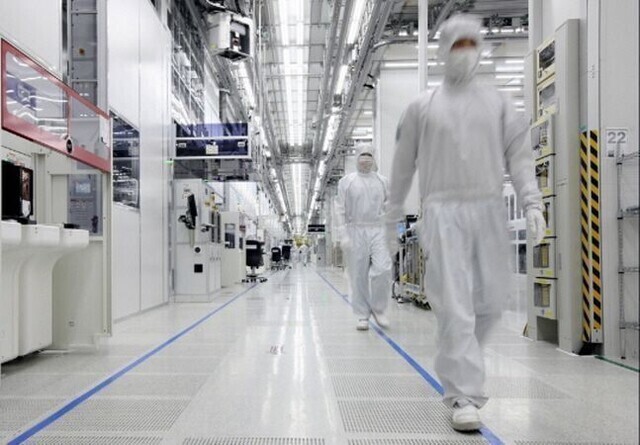hankyoreh
Links to other country sites 다른 나라 사이트 링크
US allows Samsung, SK to import advanced equipment to chip plants in China

The US government has agreed to allow US-made equipment to be taken into Samsung Electronics and SK Hynix semiconductor plants in China without separate permission, the South Korean presidential office officially confirmed.
According to semiconductor businesses, this relieves a large part of the uncertainty surrounding semiconductor production and investment in China. Even so, the expansion of factories in China remains blocked by US regulations.
During a briefing on Monday, Choi Sang-mok, the senior presidential secretary for economic affairs, said, “The US government has made the final decision to supply US-made semiconductor equipment to Samsung Electronics and SK Hynix factories in China without separate permission procedures or time limits.”
Since imposing a de facto ban on exports of advanced semiconductor equipment to semiconductor businesses in China last October, the US government had granted a one-year grace period on its export controls for Samsung and SK factories in China.
Samsung Electronics operates semiconductor plants in the Chinese cities of Xi’an and Suzhou, while SK has plants in Wuxi, Chongqing and Dalian.
The US government informed South Korea that it intends to designate the two companies’ semiconductor plants in China as “validated end-users.” This system provides blanket permissions on exports of designated items for pre-approved companies to promote trade in cases where their use is deemed unquestionably to be by the private sector.
This means that Samsung and SK will be able to bring equipment to their Chinese plants without requiring individual permissions.
Since the US government introduced the limited grace period for its restrictions last October, the South Korean government has been repeatedly asking it to grant an indefinite extension. According to sources, it has recently been engaged in working-level discussions on the scope of the designated items companies will be allowed to use at their Chinese plants.
“The US government’s decision signifies the end of the most pressing issue for South Korean semiconductor companies,” Choi said.
“The uncertainty surrounding the operation of and investment in South Korean semiconductor companies’ factories in China has been largely resolved, and we are now able to proceed calmly in the long term with developing a global management strategy,” he explained.
South Korean businesses said the decisions did indeed resolve much of the uncertainty surrounding semiconductor plants in China.
“Through close discussions between governments, the uncertainties concerning the operation of semiconductor production lines in China have been largely resolved,” a Samsung Electronics official said.
Similarly, an SK Hynix official said the US government’s decision would “contribute to global semiconductor supply chain stabilization.”
Meanwhile, the US government recently finalized CHIPS and Science Act guardrail regulations that bar expansions of Chinese-based factory production capabilities above 5% over a 10-year period for semiconductor companies that are receiving subsidies. It did not incorporate requests from the South Korean government and businesses to loosen its standards on expansions.
By Kim Hoe-seung, senior staff writer; Bae Ji-hyun, staff reporter
Please direct questions or comments to [english@hani.co.kr]

Editorial・opinion
![[Editorial] Intensifying US-China rivalry means Seoul must address uncertainty with Beijing sooner than later [Editorial] Intensifying US-China rivalry means Seoul must address uncertainty with Beijing sooner than later](https://flexible.img.hani.co.kr/flexible/normal/500/300/imgdb/original/2024/0517/8117159322045222.jpg) [Editorial] Intensifying US-China rivalry means Seoul must address uncertainty with Beijing sooner than later
[Editorial] Intensifying US-China rivalry means Seoul must address uncertainty with Beijing sooner than later![[Column] When ‘fairness’ means hate and violence [Column] When ‘fairness’ means hate and violence](https://flexible.img.hani.co.kr/flexible/normal/500/300/imgdb/original/2024/0516/7417158465908824.jpg) [Column] When ‘fairness’ means hate and violence
[Column] When ‘fairness’ means hate and violence- [Editorial] Yoon must stop abusing authority to shield himself from investigation
- [Column] US troop withdrawal from Korea could be the Acheson Line all over
- [Column] How to win back readers who’ve turned to YouTube for news
- [Column] Welcome to the president’s pity party
- [Editorial] Korea must respond firmly to Japan’s attempt to usurp Line
- [Editorial] Transfers of prosecutors investigating Korea’s first lady send chilling message
- [Column] Will Seoul’s ties with Moscow really recover on their own?
- [Column] Samsung’s ‘lost decade’ and Lee Jae-yong’s mismatched chopsticks
Most viewed articles
- 1[Editorial] Transfers of prosecutors investigating Korea’s first lady send chilling message
- 2For new generation of Chinese artists, discontent is disobedience
- 3S. Korea “monitoring developments” after report of secret Chinese police station in Seoul
- 4Xi, Putin ‘oppose acts of military intimidation’ against N. Korea by US in joint statement
- 5[Photo] 1,200 prospective teachers call death of teacher “social manslaughter”
- 6[Exclusive] Unearthed memo suggests Gwangju Uprising missing may have been cremated
- 7N. Korean media upgrades epithet for leader’s daughter from “beloved” to “respected”
- 8[Column] Samsung’s ‘lost decade’ and Lee Jae-yong’s mismatched chopsticks
- 9[Editorial] Intensifying US-China rivalry means Seoul must address uncertainty with Beijing sooner t
- 10[Special reportage- part I] Elderly prostitution at Jongmyo Park